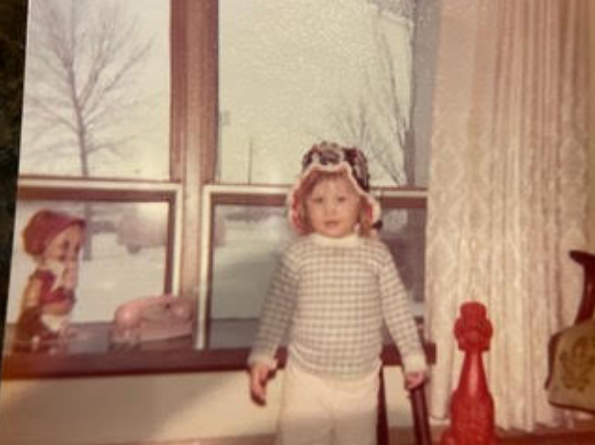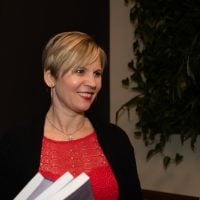This Valentine’s Day marked the one-year anniversary of Embodying Soul: A Return to Wholeness—A Memoir of New Beginnings, my first book, getting birthed into the world.
I chose Valentine’s Day as my publishing date (I self-published) because while my book delves into many topics—empowerment, courage, transformation—it’s ultimately a journey of moving from critical self-judgment, stifling shame, and anxiety to self-love. From there, and only from there, the rest of my growth was made possible.
Below is an excerpt from the book, namely the prologue, entitled “Family Flags.”
The book begins with my family of origin and my North Dakota upbringing because the truth is this: we cannot journey to greater truth and wholeness without reflecting back on our childhood conditioning. It’s not about blaming others, but understanding patterns. And then, breaking the patterns that cause harm, while building new, healthier ones.
May it be of benefit.
“Family Flags”
“Let’s begin today by going back to your childhood. What would you say were your family’s core values?” asked my rosy-cheeked, spiky-haired, middle-aged therapist while holding a ballpoint pen an inch away from her yellow legal pad, ready to scribble my family wisdom.
Her office, tucked in a basement in a suburb of Minneapolis, was comfortable, quiet, and warm. On the wall behind her were several framed diplomas, on the wall to my right some abstract art, and the wall to my left, where a clock should’ve been to ensure clients didn’t overstay their times was blank—like my mind had just gone.
A mug of steaming peppermint tea cupped in my hands intended to calm me, I considered what my childhood could have had to do with my current anxiety and depression. I’d already had a few appointments with this therapist during which we’d concentrated on the impact of my anxiety on my life. I had told her about the emptiness I felt inside, the lack of clarity in my mind, my trembling, uncontrollable body.
I had explained how the anxiety made me feel cold, even while sweating across my lower back and under my arms, sometimes enough to soak through my clothing. I had revealed that most people never suspected a thing, because I hid my true feelings under layers of self-discipline.
She had asked me what situations triggered my anxiety, and I had described the small and large group settings, like my yoga classes, workshops, or trainings, where participants had to introduce themselves and share something personal. I explained that teaching yoga, a group setting where I was in control of the agenda, rarely triggered my anxiety unless it was the first day of a new session with new students or I was a substitute teacher for someone else’s class. But once I got to know my students no one guessed that I suffered from anxiety or, for that matter, that I was an introvert. So, I had told her, I just waited for the feelings of anxiety to dissipate, knowing my body would settle in a few weeks’ time and that it would be worth the wait. I had told her that teaching yoga was a calling, that when I was teaching I felt more whole and alive than in any other area of my life, and I would not, could not, give it up.
She had listened to my description, asked follow-up questions, and called my anxiety “social anxiety.” That was fine with me, though I would have called it “lack of control” anxiety. She had then asked what calming techniques I’d tried. I explained that I knew all kinds of breathing techniques and positive visualizations and affirmations but that in moments of debilitating anxiety nothing worked. I had told her that all I could do was wait for the situation that triggered the anxiety to end, after which fatigue would set in. Then it’d take several hours, or even a day, to feel normal again. Those had been embarrassing admissions of weakness, but the questions had made sense so I’d answered them honestly.
But now she was probing into my childhood, and that did not seem the best use of our time, nor did it seem to honor the urgency of my situation. I was 34 years old and married, had two children, both colicky as babies, and I’d just spent the last six months battling my fourth case of hives necessitating my first emergency room visit and a daily prescription of steroids. If that wasn’t enough, the yoga classes I was teaching were on hold due to my illness, my marriage was on the verge of failure, and when I had finally felt strong enough to leave the sanctuary of my darkened bedroom to drive to Blockbuster to rent a movie, the energy required to engage in retail pleasantries as if my life was not falling apart had exhausted me so much I had gone home and fallen asleep, no longer interested in a movie or any other activity.
And here my therapist was inquiring about my childhood. What did she want to know—what kind of cake was served on my fourth birthday?
Irritated, I bit my lip, pressed the pads of my fingers into my temples, and said, “I’m sorry, I guess I don’t understand.”
“Many families have sayings or other phrases that bind them together, like, ‘We all stand together’ or ‘Blood is thicker than water,’” she explained, patiently.
“Not mine,” I asserted, a little defensively, then gave an apologetic shrug.
“Well, let me ask this. Did you receive any kind of verbal instruction?” asked my therapist.
A memory, like a single raindrop, formed in my mind. “When my brothers and I had asked my dad what he wanted for Christmas, he had always said, ‘Good kids,’” I revealed.
“That’s great. And what did that mean to you?” she asked, encouragingly.
I dropped my head expecting a curtain of long, brown hair to fall around my face, forgetting that I’d recently cut it short. I brushed my bangs forward and replied, “Follow rules, don’t cause trouble, stay out of the way. It was just a joke, though. We usually got him socks or something.”
“Were you the kind of kid to cause trouble?” she asked, pressing me further.
I sniggered and answered, “Me? Hardly. Goody-two-shoes is more like it.” My self-loathing released a stream of something like endorphins through my body, and it felt kinda good, like a smoker taking a long-awaited drag on a cigarette. At least it felt better than being confused and vulnerable.
“Okay, then, any other instructions or mottoes from home?” she inquired, smiling, her cheeks forming small apples beneath her eyes.
The fact that she wasn’t letting this probing go made me realize I was failing to adequately answer what must’ve been to her a straightforward question. I felt anxious, imagining her other clients rattling off family mottoes. Trying a little harder, I set the tea on a coaster on the polished glass table before me, let my eyes roll upward, and strained to hear some other slogan, statement, or manifesto from my childhood inside the cavern of my mind. But all I heard was the North Dakota wind howling.
“I can’t think of anything else,” I said, attempting a tone of finality and authority.
“Well,” she continued, unfazed, “think of it another way. If your family had had a flag flying outside your house, what would it have said?”
I stifled a chuckle. A flag flying outside our house? We never would have let ourselves be so visible. We were a quiet family living a simple life, frugally, with a sense of duty and pride—not the outer pride of boasting and flying flags but an inner pride that worked like an invisible rubber band of resilience and resolve. The world could pull on us, but we always snapped back—except for me, apparently. I wondered what my family would think if they knew I was seeking help from a shrink just to get by day to day and paying for it with hard-earned money, not even my money but my husband’s money, since my little hobby of a yoga business didn’t pay the bills and my business degree was sitting in a drawer somewhere turning yellow rather than proudly displayed on a wall like my therapist’s. My parents wouldn’t have had time for such psycho-babble. They would have persevered through the pain, if indeed they were forced to recognize it.
I considered the two choices I saw before me: A) tell my therapist what I thought about her nosy, irrelevant question, storm out, and never return; or B) tell her nothing of my discomfort, grit my teeth, and muster up a good enough answer to her searching question. But I knew that option A was not a valid option; showing frustration or confusion was to me at this time synonymous with admitting weakness and letting people see weakness left me dangerously vulnerable and exposed.
“Do what you have to do now, you can panic later,” my mom had always said, even though I never really saw her panic later. I only heard her crying once, quietly, as I listened at her bedroom door and knew better than to ask her about it, then or later. Dwelling on emotions solved nothing, pulled energy away from urgent daily tasks, and clouded the focus on building and sustaining a good local reputation.
Option B was what I knew, so option B was what I took. Like opening up a family album that had been tucked away in a closet for years, I creaked open my memories of childhood, figuring my therapist would soon see that my ancient past had little relevance to my present concerns, and then we could begin addressing my anxiety. If we didn’t, I still wouldn’t have to do anything uncomfortable like confront her. I could just stop making appointments and move on with my life.
What I didn’t see at the time was how certain family behaviors would turn out to be red flags, revealing the behaviors and internal barriers I would need to understand and overcome before I could forge an enduring and loving relationship with myself and my emotions—a strong foundation upon which I could build a life marked by courage, creativity, and curiosity.
To me, this is the very definition of embodying one’s soul.
~
From now until March 31, 2021, in celebration of the book’s anniversary, visit Embodying Soul’s website to receive a BOGO offer.


 Share on bsky
Share on bsky





Read 14 comments and reply